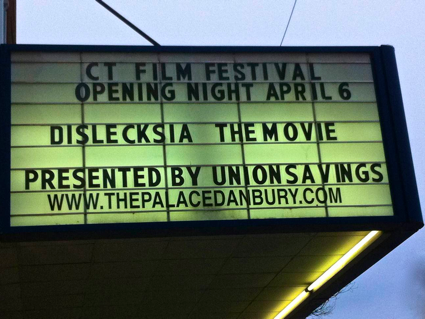
I went to a preview screening of this documentary last night. It was just rough clips of an independent film in the making, interspersed with commentary, and concluded with a panel discussion. I can’t therefore review and rate this as a movie yet, but I’ll share what I learned, as well as some of my perspectives that the evening prompted. (And just to be clear, we are talking about dyslexia; the movie title intentionally misspells this as dyslexics are notorious for bad spelling.)
Dyslexia means difficulty with written language, and they tell me that literally their brains are wired differently. The issues of no two dyslexics are alike, which is partly why it is such a slippery challenge to have or to help. The statistics shared last night are that 1 out of 7 people are dyslexic. Dyslexia is an input issue, not an output issue, so reading is a problem more than writing if you can get around the spelling impediment.
Many dyslexic people are incredible macro thinkers and very creative thinkers; a high percentage of millionaires, CEO’s, and artists of all types (people that like to work with their hands) are dyslexic. On the other end of the spectrum, 85% of the people in the prison system are dyslexics. As far as they can tell, the difference between these two widely divergent groups is the level of their mother’s advocacy for them in making sure their needs were met.
One would think that we would gladly trade a large chunk of our prison funding for preparing teachers and school systems to help this unreached segment of society. Some parents don’t have either the funds, the information, or the language skills required to meet this challenge. A mom on the panel, had a dyslexic child of hers graduate from Princeton, and he had “accommodations” that the school is required by law to respect. She said the best thing she did was read aloud every day to her son, even through high school. She had the means for diagnosis, for legal help to obtain accommodations, and was educated enough to provide a language rich environment for her child to come into his own within. Presently, the American school system has 13 learning differences that they test for and try to meet with extra help. Dyslexia is not one of them, even though it is more pervasive than any of the thirteen that they do recognize. If a child is not helped, but left to continually, fail, fail, fail, and be continually passed over, it is not uncommon for them to act out in frustration, which can land them in prison as wards of a state that wouldn’t serve them in the first place.
And while diagnosis and accommodations sound helpful on the one hand, they are unfair limitations in my view. Labels provide excuses not to progress past a certain point. Hard work between any student and a dedicated, informed teacher, will yield progress beyond what labels could ever project. With individual hard work, you will discover what works for you and yours, especially since every dyslexic learns differently. I’m all for teachers meeting the needs of students where they are, but I balk at the phrase “learning disabled.” Can’t we just think in terms of “learning differences,” which doesn’t presume judgement on some ways being right and the others wrong?
The way each of us are created is full of gifts; we each have something special to offer which we are uniquely “wired” for. If someone needs an accommodation, that’s fine, and I don’t judge them for it. Sometimes we give the weakest players a head start, but do we expect them to be the weakest players forever? By giving them a chance to play, we’ve given them a chance to get better. A kid with a handicap who works harder than someone for whom it comes easier, often does better. Maybe we should call the kid without the work ethic as the one handicapped instead. Natural abilities may vary, but I say we should encourage everyone to run with their strengths and manage their weaknesses. I’m absolutely convinced as a mother, as an educator, and as a spiritual professional, that everyone, without exception, has their strengths and that we should play to that.
Our local ritzy private school is opening a new school just for those with dyslexia. The panelist from there last night distilled the discussion beautifully, stating that it is all a problem of motives. Are we trying to assist every child to be all they can be or are we merely after them to meet fixed, minimum standards. The answer to that question will make all the difference. We’ll marginalize ourselves if we are just trying to meet minimum standards. If, however, we are after individually supporting students in being all they can be, education would look much different. Instead of schools being organized by location, maybe it would make more sense to group kids by learning styles! Add to that smaller class size and research based teacher training – funded from a smaller future prison system – and we’d be getting somewhere.






